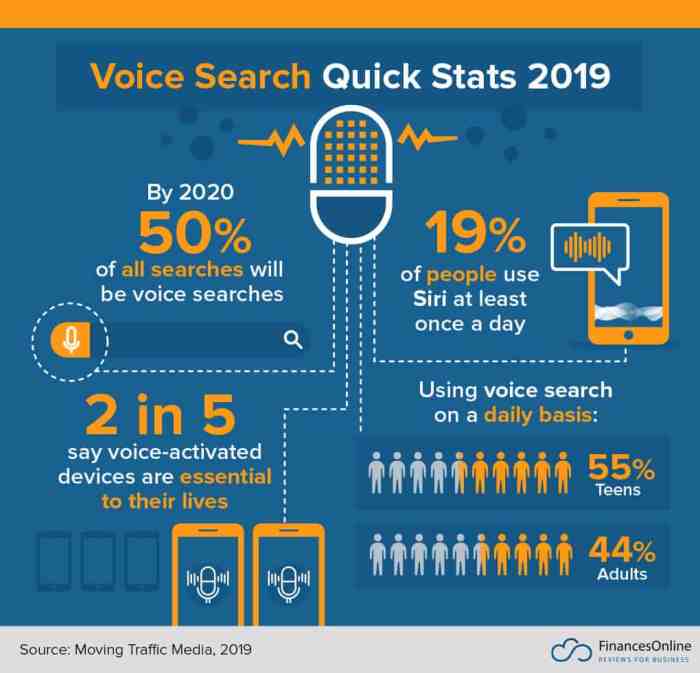Optimizing for Voice Search SEO – Kicking off with Optimizing for Voice Search , this opening paragraph is designed to captivate and engage the readers, setting the tone american high school hip style that unfolds with each word.
In today’s digital world, understanding and implementing Voice Search is crucial for businesses looking to stay ahead of the game and reach their target audience effectively. By optimizing for voice search, businesses can enhance their online visibility and attract more organic traffic. Let’s dive into the key strategies and factors that can help businesses succeed in Voice Search .
Understanding Voice Search : Optimizing For Voice Search SEO
Voice Search refers to the process of optimizing your website content to appear in voice search results, which are generated when users speak queries into voice-activated devices like smartphones, smart speakers, or virtual assistants.
It differs from traditional in that voice search queries are often longer and more conversational in nature, as people tend to speak differently than they type. This means that the s and phrases targeted for voice search optimization may vary from those used in traditional strategies.
The Importance of Optimizing for Voice Search
Optimizing for voice search is crucial in today’s digital landscape as the use of voice search continues to rise. Some key reasons why optimizing for voice search is important include:
- Voice search usage is increasing rapidly, with more people using voice-activated devices for search queries.
- Voice search provides quick and convenient access to information, making it a preferred choice for many users.
- Optimizing for voice search can help improve your website’s visibility and ranking in search engine results pages.
Statistics and Trends Related to Voice Search
Here are some statistics and trends that highlight the impact of voice search on strategies:
“By 2022, it is estimated that 55% of households in the U.S. will own a smart speaker.”
- Over 40% of adults now use voice search on a daily basis.
- Voice search queries are often local in nature, with users seeking information about nearby businesses or services.
- Voice search is expected to continue growing, shaping the way websites are optimized for search engines.
Key Factors for Optimizing Voice Search

Voice search is becoming increasingly important in the digital landscape, and understanding the key factors that influence voice search rankings is crucial for businesses looking to stay ahead of the curve. Let’s dive into some of the main elements that play a role in optimizing for voice search:
Featured Snippets and Structured Data
Featured snippets are concise answers to user queries that appear at the top of search results. Optimizing your content to appear as a featured snippet can significantly increase your chances of being selected by voice assistants like Siri or Google Assistant. Structured data, such as schema markup, helps search engines understand the context of your content, making it more likely to be included in featured snippets.
- Ensure your content is concise and directly answers common user questions.
- Implement structured data markup to provide context to search engines.
- Optimize for long-tail s and natural language queries.
Local and Voice Search
Local is essential for businesses looking to capitalize on voice search queries with local intent. Optimizing your website and online profiles for local search can help you attract nearby customers who are using voice search to find products or services in their area.
- Create a Google My Business profile with accurate location information.
- Optimize your website for local s and phrases.
- Incorporate local landmarks and points of interest in your content.
Creating Voice Search-Friendly Content

In order to optimize your content for voice search, it is crucial to consider the following tips to ensure that your website is easily discoverable through voice-activated searches.
The Importance of Natural Language and Conversational Tone, Optimizing for Voice Search SEO
When creating content for voice search, it is essential to use natural language and a conversational tone. People tend to use more casual language when speaking compared to typing, so your content should reflect this. Avoid using overly formal or technical language, and instead, focus on creating content that sounds like a friendly conversation.
- Use everyday language: Opt for simple and clear language that your audience would use in everyday conversations.
- Avoid stuffing: Focus on providing valuable information naturally instead of cramming s into your content.
- Answer questions directly: Anticipate common questions related to your topic and provide concise answers in your content.
Formatting Content to Answer Voice Search Queries Concisely
In addition to using natural language, formatting your content to answer voice search queries concisely is crucial for improving your chances of appearing in voice search results.
- Create FAQs: Develop a list of frequently asked questions related to your topic and provide clear and concise answers.
- Use structured data: Implement schema markup to help search engines understand the context of your content and improve your chances of appearing in featured snippets.
- Focus on long-tail s: Incorporate conversational long-tail s that are more likely to be used in voice searches.
Technical Optimization for Voice Search
When it comes to optimizing a website for voice search, there are some key technical aspects to consider. This includes mobile optimization, site speed, schema markup, and rich snippets.
Importance of Mobile Optimization and Site Speed
Mobile optimization is crucial for voice search because most voice searches are done on mobile devices. Ensuring that your website is mobile-friendly and responsive will improve the user experience and make it easier for search engines to crawl and index your site. Additionally, site speed is important for voice search as users expect fast and seamless results when using voice search. Slow loading times can lead to high bounce rates and decreased visibility in search results.
- Optimize images and videos to reduce load times.
- Use a content delivery network (CDN) to improve loading speed.
- Enable browser caching to store frequently accessed data for faster loading.
Implementing Schema Markup and Optimizing for Rich Snippets
Schema markup helps search engines understand the content on your website better, which can improve your chances of appearing in voice search results. Rich snippets provide users with more information directly on the search results page, increasing visibility and click-through rates.
- Use schema markup to mark up relevant information on your website, such as business details, products, and events.
- Optimize for rich snippets by providing clear and concise information that answers common user queries.
- Include structured data markup for FAQs, reviews, and other relevant content to enhance visibility in voice search results.





